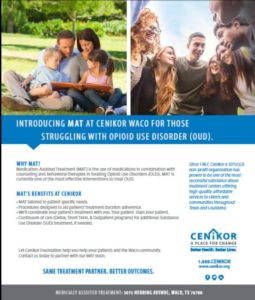By Becca Muncy
International Overdose Awareness Day is a global event that takes place on August 31 each year and aims to raise awareness of overdose and reduce the stigma of a drug-related death.
This year’s International Overdose Awareness Day in Waco will be hosted by the VASA (Voices Against Substance Abuse) Community Coalition, a program of VOICE (Viable Options in Community Endeavors), a nonprofit that teaches healthy living skills, including avoiding substance abuse. The event includes:
- Virtual overdose training from Baylor University’s Beauchamp Addiction Recovery Center (one session in the morning form 10-11:45 and one in the afternoon from 3-4:45)
- Food and refreshments from MHMR Substance Abuse Services from 1:00-6:00 PM at 2220 Austin Ave.
- NARCAN overdose reversal kits provided by Central Texas Harm Reduction, available at 2220 Austin Ave.
- T-shirts provided by Texas Harm Reduction Alliance, also available at 2220 Austin Ave.
- Referrals for free telehealth family counseling sessions for families affected by addiction
In addition to the trainings and activities listed above, the I-35 Interstate bridge near McLane stadium will also be lit purple in remembrance of those who have died or been injured by overdose.
In the United States, 67,367 overdose deaths occurred in 2018 (Center for Disease Control) and 70,980 occurred in 2019 (American Hospital Association). And with the COVID-19 pandemic, the rate of drug related deaths have risen by 18%, as people struggle with isolation and those who are in addiction recovery programs are cut off from their support systems (NPR). Now, more than ever, raising awareness of overdose, recognizing the signs of overdose, learning how to prevent or reverse overdose, and grieving with the loved ones of overdose victims is vital.
The main goal of International Overdose Awareness Day is to bring awareness and education to the community. Jessica Wheeler-Macias, Community Coalition Coordinator at VOICE, said it’s important for everyone to know the basics of overdose prevention and reversal, and that breaking down the stigma around discussions of overdose is an important step in spreading that knowledge. Breaking down the stigma includes breaking down the stereotypes of those affected by addiction or overdose. Wheeler-Macias said she wishes everyone knew that the issue of overdose doesn’t discriminate, and that there is no one type of person who will become a victim of overdose, as victims come from all walks of life. “It can be anyone,” Wheeler-Macias said, adding that family members didn’t create the disease of addiction that led to overdose.
Lily Ettinger, Assistant Director of Wellness of Recovery Services at the Beauchamp Addiction Recovery Center, stressed the importance of widespread education as well, saying, “Most people aren’t overdosing in professional settings… it’s in their homes and communities, so it’s important for everyone, not just first responders, to be empowered in knowing how to respond.” She also said something she wished more people knew about overdose prevention is that overdosing often isn’t as extreme as it’s shown in the media and that overdose deaths aren’t always instantaneous. She pointed specifically to opioid overdose, which can happen over the course of several hours, where “there is time available to save someone’s life.”
Ettinger has also seen the effect overdose education and overdose prevention has on overdose survivors, saying, “Their lives today aren’t the same as they were back then, but that’s because they were gifted the chance to survive.”
Wheeler-Macias said she hopes this event will start new conversations about overdose and overdose prevention. She hopes with the training and information provided during the event, people will be able to better identify the signs and signals of overdose and not be afraid to address it when they see it. She said the biggest takeaway she hopes people will have is the simple fact that overdose is a “completely preventable death” and that everyone has the opportunity to save a life with the appropriate training, and that the Waco community has the opportunity to raise “everyday heroes.” And in the end, those everyday heroes, Wheeler-Macias said, “Are what make the world go around… people helping people.”
For those who find themselves hungry to learn and do more after August 31, Ettinger said Waco has “a wealth of resources” including those participating in this event and beyond, like the Central Texas Harm Reduction, Cenikor, The VASA Coalition, the Poison Control Center, Oxford Houses, and the Beauchamp Addiction Recovery Center.
Sign ups for the Beauchamp Addiction Recovery Center’s overdose prevention training sessions are available at https://www.baylor.edu/barc/index.php?id=972252 and more information about International Overdose Awareness Day can be found on the VASA Community Coalition Facebook page.

Becca Muncy is an Act Locally intern from Dallas. She is studying professional writing at Baylor University and is completing her senior year.
The Act Locally Waco blog publishes posts with a connection to these aspirations for Waco. If you are interested in writing for the Act Locally Waco Blog, please email [email protected]for more information.
By Bill Baily, President and CEO of Cenikor Foundation
As the country learns to fight the coronavirus, the opioid epidemic has slipped back to the shadows. Just a few months ago, that epidemic was taking almost 200 lives per day, 67,367 in 2018, and had become a household topic. Taskforces, committees, legislators, communities and treatment providers were standing together to help make resources available for those that found themselves suffering from addiction issues.
We are facing a time of unprecedented stress and unknowns. Unemployment is rapidly rising. Social distancing brings the psychological fallout of isolation. It is vitally important, now more than ever, to the health of our nation to ensure that treatment is available and accessible. Times of high stress bring with them an increase in alcohol and drug use and abuse which compounds the issues that our families and communities are already facing. According to a National Institute on Drug Abuse report following the terrorist attacks of 9/11, “stressful times are particularly difficult for those who are more vulnerable to substance abuse and stress. Stress is one of the most powerful triggers for relapse in addicted individuals, even after long periods of abstinence”.
As we all know, hospitals are dealing daily with the pandemic and we are so grateful for the doctors and nurses showing up every day. A lesser known fact is that as stay at home orders have been issued across Texas, substance use disorder services have been designated essential services. This further emphasizes the necessity for those struggling with addictions to be able to receive the services they so desperately need. At Cenikor Foundation, we have been serving a community in the crisis of addiction for over 53 years and continue to meet the challenge through this crisis. True to the trends we have seen in previous crises, we continue to see a steady stream of calls for help. Our staff have risen to the challenge to provide safe environments for those seeking services and continue to provide daily the care that is necessary to save the lives of those suffering from addiction. We are honored and privileged to continue being a place for change during, through, and after this national crisis. Whether you or someone you love is searching for detoxification, short term residential/inpatient or outpatient treatment services in the Waco area, and whether you are insured, uninsured or under-insured, we can help. For every unique situation, there is a door to successful recovery, there are resources available and it is the right time to ask for help.

Bill Bailey has served as President and CEO of Cenikor Foundation since 2004. Through Bill Bailey’s 16 years of leadership, Cenikor has provided strategic guidance, igniting a successful cycle of growth in geographic scope and treatment services within Cenikor’s full continuum of care. Bill’s commitment to Cenikor and the overall behavioral health community is one of long-term success, focused on Cenikor raising public awareness in the areas of treatment, prevention and education, and continuing a progressive movement on a national level.
By Jessica Wheeler-Macias
Over the last 6 years, a group of concerned community members has been striving to reduce substance use and misuse in Waco and surrounding communities. The Voices Against Substance Abuse, or VASA, community coalition consists of representatives from various community sectors, such as education, law enforcement, faith-based organizations, community services, substance abuse prevention programs, businesses, local government, volunteers, parents and youth, all working to reduce the use and misuse of tobacco, alcohol, marijuana and prescription drugs among youth and young adults. The coalition’s efforts in addressing these issues target the communities as a whole through the use of environmental strategies such as media campaigns, presentations and policy development.
The coalition is currently conducting a media campaign targeting a specific method of alcohol misuse: binge drinking. For clarification, we’ve provided answers to some of the most frequently asked questions regarding binge drinking and its effects.
What is binge drinking?
The simplest answer to this question is that binge drinking is the consumption of an excessive amount of alcohol in short period of time. However, the Substance Abuse and Mental Health Services Administration (SAMHSA) defines binge drinking as the consumption of 5 or more standard drinks for men and 4 or more standard drinks for women in a single setting at least 1 day in the past 30 days. A standard drink would be 12 ounces of beer, 8 ounces of malt liquor, 5 ounces of wine or 1.5 ounces of 80 proof distilled spirits of liquor.
How dangerous is binge drinking?
The Center for Disease Control and Prevention has identified binge drinking as the most common, costly and deadly pattern of alcohol misuse. Alcohol affects many of a person’s vital functions, leading to slurred speech, unsteadiness, altered perceptions and slow reactivity. For a young person, alcohol can alter the development of their brain, causing lasting damage to memory, motor skills and coordination. The amount of alcohol consumed and how quickly it is consumed, amplifies the amount and onset of the effects of the alcohol. Binge drinking is associated with many health problems, such as accidental injuries, violence, sexually transmitted diseases, unintended pregnancy, chronic diseases, cancer, memory and learning problems and alcohol dependence. Binge drinking is a serious problem, but it is preventable.
Who is binge drinking?
According to the CDC, 1 in 6 US adults, most commonly between the ages of 18 and 34, binge drinks about four times per month, consuming about 7 drinks per binge. That’s 17 billion total binge drinks consumed by adults annually. However, it’s not just adults that are binge drinking. The CDC’s Youth Risk Behavior Survey-2017 states that, nationwide, 13.5% of high school students were binge drinking.
Is binge drinking the same as alcoholism?
Alcoholism, also known as alcohol dependence, is a chronic disease that affects all aspects of a person’s life and continues despite serious health, legal and family problems. Binge drinking is a harmful pattern of alcohol misuse that can contribute to alcohol dependence but can be stopped.
How can binge drinking be prevented?
There are several environmental strategies that can help prevent the excessive use of alcohol, including:
- Pricing strategies, such as increased alcohol taxes;
- Limiting the number of alcohol retailers and the days and hours of alcohol sales;
- Consistently enforcing laws against underage drinking and impaired driving; and,
- Screening and counseling for alcohol misuse.
However, the first step is educating individuals and communities about the dangers of alcohol use and misuse through presentations, media and substance abuse prevention programs.
Jessica Wheeler-Macias is the Voices Against Substance Abuse Community (VASA) Coalition Coordinator a program of VOICE.

Jessica has worked in the field of drug prevention education for the past five years and has a decade of experience working as a certified elementary school teacher in the State of Texas. She is the mother of 9- year-old Max Macias and 8-year-old Will Macias. Drug Prevention and community partnerships are her passion and she is happy to assist in providing your groups with presentations, booth events, as well as collaborate with your organization to create fun drug-free community events.
For more information, resources, to schedule a presentation or if you are interested in joining the Voices Against Substance Abuse (VASA) coalition please contact VOICE at 254-741-9222 or [email protected].
The Act Locally Waco blog publishes posts with a connection to these aspirations for Waco. If you are interested in writing for the Act Locally Waco Blog, please email a[email protected]for more information.
By Summer Shine
Most people are affected by alcoholism or addiction in one way or another, whether it’s their own struggle, or a family member or a friend. The disease of addiction and alcoholism has infiltrated our everyday lives. It’s become so prevalent that the CDC proclaimed the opioid crisis in northern states is becoming a national crisis. According to a recent study by the Surgeon General’s office, 1 in 7 Americans suffer from drug or alcohol addiction. Many are touched, but few know what help there is for people who have this disease.
When I decided to get sober in 2013 I, fortunately, had previous experience with recovery and family and friends who were still willing to help. Not all who are afflicted are as lucky as I was. Many find themselves without resources or on long waitlist to get into any sort of treatment facility. Another challenge is that after a short term stay, typically 30-60 days, clients in recovery are expected to figure out a new lifestyle, housing and a recovery plan, with very little assistance. This becomes a major turning point for many people who are seeking long term recovery. What are they to do? Where are they to go? Who is their new support system? These can be stressful and confusing times.
Sober living communities are popping up all over the country as solution to this problem. These homes offer safe, affordable housing in an environment where a recovery lifestyle is commonplace, and mistakes are used as learning tools. Most Sober Living Houses (SLH) require participation in 12-step recovery programs, have straight forward house rules and adhere to probation requirements.
Another study by National Center for Biotechnology Information shows that people in recovery who live in short-term housing for 6-9 months after treatment have a 70% better chance of staying sober for 2 or more years than people who go straight back into old environments.
In 2015 when Sunshine Recovery House opened its doors, there were 5 sober living houses for men in the Waco area and none for women. Historically women are underserved both in addiction recovery and in mental health services. Being a woman in recovery and having many close female friends who are both in recovery and have mental illness, I found the lack of resources disturbing and appalling.
Not being one to take the sidelines when there is a problem to be solved, I addressed the issue and opened a sober living house here in Waco for women! We currently rent 2 small houses close to the old Hillcrest. We have nine beds and are usually full with a waitlist. We recently formed as a nonprofit organization and are raising money to purchase one large house close to downtown that will house 12-14 women and host a live-in house manager.
Waco has been an amazing advocate for Sunshine Recovery House! We’ve seen people come out of the woodworks (figuratively and literally) to show us support and help us expedite the process. It’s been both heartwarming and awe inspiring to see the amount of love people have shown us. More importantly we have been privy to seeing the lives of women in this community radically changed. We’ve seen miracles happen and that is the real game-changer. Women get their kids back, pay off debt, find wonderful careers, go to school, finish probation or clear CPS cases. THESE ladies are the reason we fight through the hard times, and trust me, there are hard times.
I am lucky. I’m lucky to have women in my life who are fighting the same fight I am, who show up to support me and who make the simple, yet hard decision to allow God to change them completely. I’ve learned along the way that I can only keep what I’ve been given, freedom from active addiction, by giving it away.
If you, or someone you love is suffering from addiction or alcoholism, know that there is help. There are 2 treatment facilities in the Central Texas area and a whole host of them in DFW and Austin. More sober living houses are being opened and often I am seeing young people get sober before they have had to suffer some of the same consequences that many have. It’s hopeful and magical and God induced. Some may say it’s a lofty goal to want to eradicate addiction and alcoholism all together, but why not try?
Rollin’ 4 Recovery

Join us March 23rd for a night of laughter, music, food, fun and friends. Comedian Shayne Smith is unapologetically goofy and recants his experiences through hilarious rants about life as a real gangsta….er, geek! Hear some sick beats laid down by Waco’s own Ryan Thomas as he takes us on a lyrical journey through interpretive spoken word, also known as rap. Enjoy a delicious meal provided by Waco’s #1 food truck Club Sandwich and signature mocktail beverages provided by Luna Juice Bar. Not to mention the savage live auction items up for grabs. Trust us, you won’t want to miss this night! If you’d like to mail a check for sponsorship or tables please mail to: Sunshine Recovery House 1516 Austin Ave Suite 3 Waco, TX 76701 Rollin’ 4 Recovery
- March 23 – 7 PM
- Brazos Event Center, 520 Elm Ave.
- General admission $50 – $70. VIP and Table Sponsor opportunities available. Click here for Tickets: Rollin 4 Recovery.

Summer Shine is Owner / Operator / General Juice Slinger at Luna Juice Bar and a Hip Hop Dancer at God’s Great Kingdom.
The Act Locally Waco blog publishes posts with a connection to these aspirations for Waco. If you are interested in writing for the Act Locally Waco Blog, please email [email protected] for more information.
By Eric R. Jeter
In the midst of the opioid crisis, communities across the country face increased demands for prevention and substance use services.
According to the CDC young adult’s heroin use has more than doubled within the past decade. More than 90 percent of people who use heroin also use at least one other drug, 45 percent of people using heroin are also addicted to prescription opioid painkillers and that prescription opioid drug overdoses has increased threefold in the last three years. In addition, an estimated 2.1 million people in the United States are afflicted with Opioid Use Disorder (OUD) related to prescription opioid pain medicines in 2016. There’s an increasing number of infants born with opioid dependency and rising rates of diseases such as Hepatitis C, and HIV. It is safe to say that the United States is facing a very real crisis.
The silver lining in this cloud is that there are effective medications to treat opioid use disorder. The use of these medications in treatment is called MAT, which stands for Medication Assisted Treatment.
Many treatment programs and behavioral health providers are increasingly now provide MAT. Cenikor Foundation, a leading treatment provider with locations in Texas and Louisiana, offers MAT as one of multiple treatment methods.
In August 2018, Cenikor’s Waco Facility began offering MAT (Medication Assisted Treatment) services for Opioid Use Disorder (OUD) in its 3015 Herring Avenue location. Opened in 2012, Cenikor Waco provides treatment services for individuals affected by substance use disorders in its detox and short stay residential programs. With the addition of MAT to its treatment services, Cenikor Waco is widening access to treatment for the community and providing patient-focused treatment designed to meet individual needs, thereby changing and saving more lives.
The goal of the MAT program offered by Cenikor’s Waco Facility is to support an individual’s efforts to remain abstinent from opioids and other drugs of addiction through the use of counseling, medication and case management services. The philosophy of the program is one of compassionate care with an emphasis on participant safety and personal responsibility.
Medicated-Assisted Treatment (MAT) is the use of FDA- approved medications, in combination with counseling and behavioral therapies, to provide a “whole-patient” approach to the treatment of substance use disorders.
As we seek to provide services to help those with an opioid use disorder achieve lasting sobriety, we recognize that no treatment is “one size fits all”. Cenikor is committed to partnering with patients to design a treatment that best meets their needs. At Cenikor, we use new ways to gauge success beyond simply whether a patient in recovery has stopped using opioids. Our comprehensive approach aims to reduce relapse overdoses and infectious disease transmission among numerous outcome measures.
We continue to work with our referral partners as well as health care professionals to ensure individuals with opioid use disorder continue to have access to the most effective therapies.
Cenikor is a 501(c)(3) nonprofit organization, proudly serving over 1,000 clients per week to achieve better health and better lives. For more information please visit www.cenikor.org or call 1-888-CENIKOR.
 Eric R. Jeter has been with Cenikor Foundation since 2012. As Construction Manager he oversaw the construction and opening of Cenikor’s Waco facility. After successfully running the Waco short stay and detox program he advanced to Regional Director. Eric now manages the Waco, Austin and Tyler locations. Eric is deeply committed to Cenikor’s mission and helping those in need achieve better health and better lives. Additionally, Eric is the President & Owner of locally owned business Jeter Property, a custom home building and remodel company located in Waco.
Eric R. Jeter has been with Cenikor Foundation since 2012. As Construction Manager he oversaw the construction and opening of Cenikor’s Waco facility. After successfully running the Waco short stay and detox program he advanced to Regional Director. Eric now manages the Waco, Austin and Tyler locations. Eric is deeply committed to Cenikor’s mission and helping those in need achieve better health and better lives. Additionally, Eric is the President & Owner of locally owned business Jeter Property, a custom home building and remodel company located in Waco.
The Act Locally Waco blog publishes posts with a connection to these aspirations for Waco. If you are interested in writing for the Act Locally Waco Blog, please email [email protected] for more information.

